 The Dead Cat Tail Assassins by P. Djèlí Clark
The Dead Cat Tail Assassins by P. Djèlí Clark Format: eARC
Source: supplied by publisher via Edelweiss
Formats available: hardcover, ebook, audiobook
Genres: epic fantasy, fantasy, urban fantasy
Pages: 208
Published by Tordotcom on August 6, 2024
Purchasing Info: Author's Website, Publisher's Website, Amazon, Barnes & Noble, Kobo, Bookshop.org, Better World Books
Goodreads
The Dead Cat Tail Assassins are not cats.
Nor do they have tails.
But they are most assuredly dead.
Nebula and Alex Award winner P. Djèlí Clark introduces a brand-new world and a fantastical city full of gods and assassins.
Eveen the Eviscerator is skilled, discreet, professional, and here for your most pressing needs in the ancient city of Tal Abisi. Her guild is strong, her blades are sharp, and her rules are simple. Those sworn to the Matron of Assassins―resurrected, deadly, wiped of their memories―have only three unbreakable vows.
First, the contract must be just. That’s above Eveen’s pay grade.
Second, even the most powerful assassin may only kill the contracted. Eveen’s a professional. She’s never missed her mark.
The third and the once you accept a job, you must carry it out. And if you stray? A final death would be a mercy. When the Festival of the Clockwork King turns the city upside down, Eveen’s newest mission brings her face-to-face with a past she isn’t supposed to remember and a vow she can’t forget.
My Review:
Consider it 50/50 on the name. They’re not cats, they don’t have tails, (they’re also not wearing cat’s tails) but they absolutely are assassins and they are most definitely dead.
They are also not supposed to have a single, solitary memory of who they were when they were alive, or whatever caused them to swear themselves to Aeril, the Matron of Assassins and goddess of knives. And chefs, because knives.
Our story begins with a member of the Dead Cat Tail Assassins, Eveen the Eviscerator, taking a contract on behalf of her goddess. At first, it seems above board – or at least as above board as any contract to assassinate someone can be.
And that’s where things get interesting. And absorbing. And compelling. And utterly profane in the best way possible.
Because the person that Eveen is contracted to and absolutely MUST kill on pain of her own eternal torment is herself. Her old self. Her former self. The self she must have been twenty or so years ago, before she died and pledged herself to her goddess.
A self she is not supposed to be able to remember, because that’s the way the contract with the Matron of Assassins is supposed to work.
Someone clearly found a loophole. A big one. Eveen can’t kill herself, not even her rule-following, goody-two-shoes former self. Because seeing the person named Sky that she once was gives Eveen the one thing she’s not supposed to have – memories.
Not that either her past memories or her present ones explain not just how someone managed to tear this gigantic hole in the contract between Aeril and her contracted assassins, but a hole in the whole, entire, space time continuum.
And as big a question as that how is in a magical sense, an even bigger question is why anyone would go to this much trouble to torment one assassin, because this is way too big a mess to create for shits and giggles, and Eveen is merely one assassin among many.
But whether the motive behind this magical mess is in Sky’s long-dead past or Eveen’s recently dead past, this once and perhaps future assassin has until dawn to solve the mystery.
Or face consequences that this time she hasn’t even earned. Or has she?
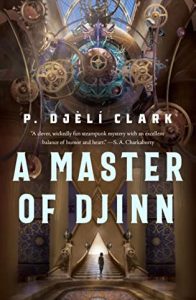 Escape Rating A+: I picked this up because I adored the author’s Dead Djinn Universe, particularly the utterly marvelous A Master of Djinn. I wasn’t expecting this to be quite like that, although I certainly wouldn’t mind another foray into the Dead Djinn Universe, but I knew that whatever this turned out to be, it would be awesome. And it absolutely was.
Escape Rating A+: I picked this up because I adored the author’s Dead Djinn Universe, particularly the utterly marvelous A Master of Djinn. I wasn’t expecting this to be quite like that, although I certainly wouldn’t mind another foray into the Dead Djinn Universe, but I knew that whatever this turned out to be, it would be awesome. And it absolutely was.
Also cats. I fully admit he had me at cats. Even though I knew going in that there weren’t any actual cats.
What I was not expecting was a world that had some surprising resemblances to Max Gladstone’s Craft Sequence/Craft Wars series, but it’s certainly there in the contractual obligations between gods and their agents, either or both of whom may be dead but still working and still bound by their contracts.
What makes this story work so well, so damn well in fact, is the relationship that develops between Eveen and Sky. They are day and night in so many ways, and yet, they are each other’s past and future and neither knows what caused the one to make the choices that led to the other.
In their mirror imaging of each other, they manage to reach through the silvered glass and work towards each other while still remaining who they are and it’s fascinating to watch. (It’s a bit like one of the Doctor Who episodes where the past Doctors get dragged into the present Doctor’s current dilemma, which was a lot of fun to see. Because it is.
At the same time, Sky’s astonishing advent into Eveen’s world lets Eveen show it to us as well. It’s a world that, for all its differences to ours, works both surprisingly well and every bit as badly in some of the same ways. Clearly, humans are gonna human, even when they’re dead. Or all powerful. Or both.
While the motives behind this whole mess are not, in the end, all that original, the execution (pardon all the puns) most definitely is, in a way that kept this reader at least on the edge of her seat until the bittersweet end. Which could, possibly, hopefully, lead to a new beginning.
Because if this turned out to be the start of a series, I absolutely would not mind AT ALL.

 "How to Raise a Kraken in Your Bathtub" by P. Djèlí Clark in Uncanny Magazine Issue 50, January-February 2023 by
"How to Raise a Kraken in Your Bathtub" by P. Djèlí Clark in Uncanny Magazine Issue 50, January-February 2023 by 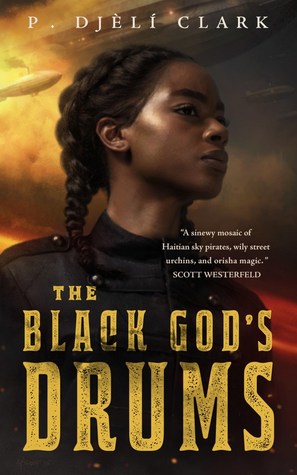 The Black God's Drums by
The Black God's Drums by 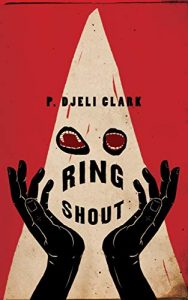 Right alongside the coming-of-age story of Creeper, a girl on the cusp of adulthood (Creeper’s OK with creeping up to adulthood, but she’s much less sanguine about approaching womanhood in any way, shape, or form) who wants more than anything to find a way out of the city she has lived in all of her life. She thinks her accidental discovery of a plot to drown the city in magically created storms can be traded for a berth on a smuggler’s airship.
Right alongside the coming-of-age story of Creeper, a girl on the cusp of adulthood (Creeper’s OK with creeping up to adulthood, but she’s much less sanguine about approaching womanhood in any way, shape, or form) who wants more than anything to find a way out of the city she has lived in all of her life. She thinks her accidental discovery of a plot to drown the city in magically created storms can be traded for a berth on a smuggler’s airship.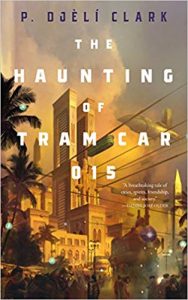 And on top of all that, we have not just the coming-of-age story, but a pulse-pounding adventure with deadly danger both in the immediate term and in the consequences if things go wrong. As they very nearly do. Along with the possibility of a daring rescue by pirate airship – or an ignominious crash of defeat.
And on top of all that, we have not just the coming-of-age story, but a pulse-pounding adventure with deadly danger both in the immediate term and in the consequences if things go wrong. As they very nearly do. Along with the possibility of a daring rescue by pirate airship – or an ignominious crash of defeat.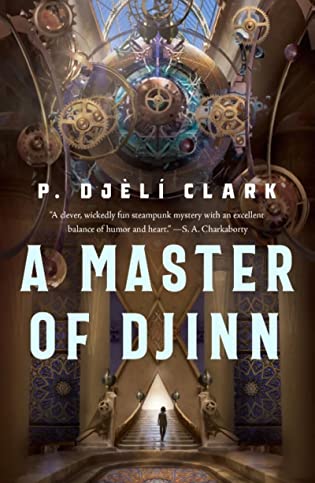 A Master of Djinn by
A Master of Djinn by 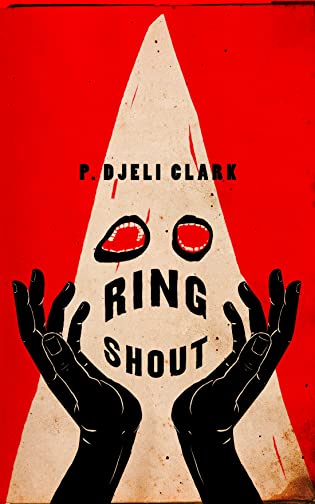 Ring Shout by
Ring Shout by 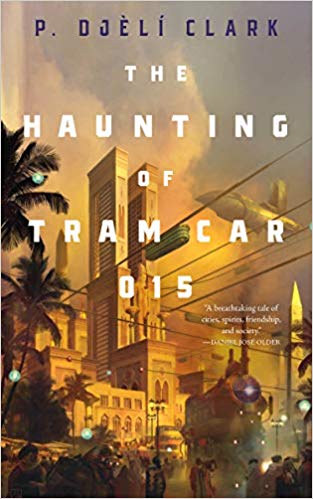 The Haunting of Tram Car 015 by
The Haunting of Tram Car 015 by 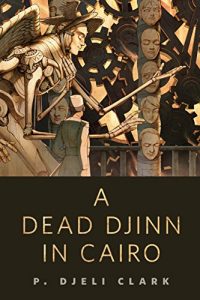 We only get hints of what the djinn are capable of in this story (I hope there’s more in the author’s previous work,
We only get hints of what the djinn are capable of in this story (I hope there’s more in the author’s previous work,